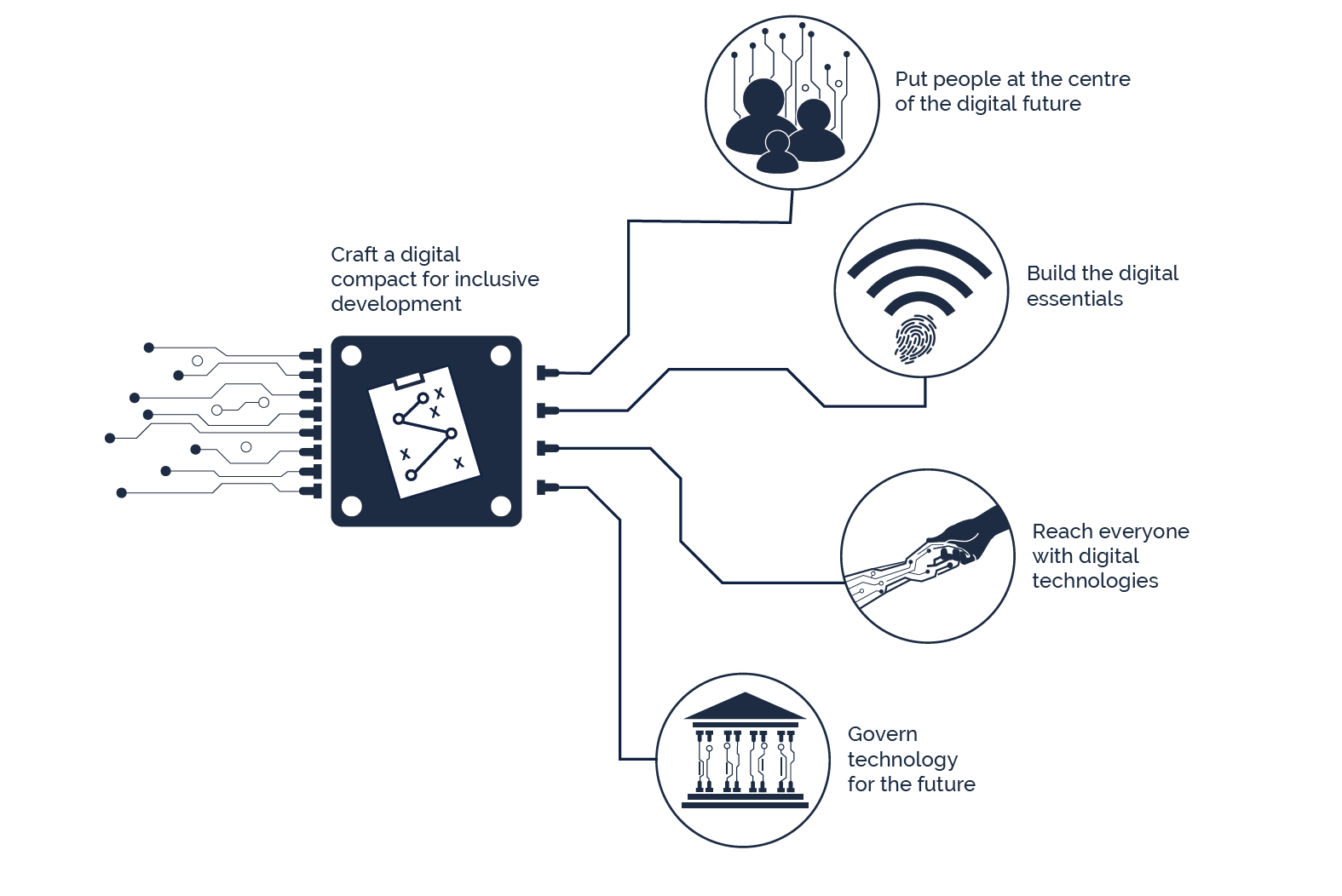Digital technologies are transforming the world, and nowhere are the stakes higher than in developing countries. The Digital Roadmap sets out 26 concrete recommendations across 5 priorities to ensure that the digital revolution leads to inclusive growth for everyone.
This is a critical moment in history. Some countries will prosper in a new global digital economy, but countries that are not ready will risk being left behind.
Countries have the agency to act now. The Digital Roadmap identifies five priority areas for countries to create their own digital future.
Technology will not guarantee success, no matter how innovative it is. Just as important as new technology is the social and economic environment in which technology is used.
Technology will almost always be a force for growth, but technology is not automatically a force for inclusion. Without deliberate effort to include everyone, digital technologies can end up entrenching existing inequality.
Government, civil society and the private sector should come together to craft a shared national vision. Everyone has a role to play in major economic transformation.
With new digital technologies come opportunities for low and middle-income countries to diversify their economies, create new jobs, transform agriculture, and improve health and education. But digital technologies can also entrench exclusion and disrupt peoples’ livelihoods. This report, based on two years of research and analysis, is underpinned by learning and extensive engagement with policymakers, entrepreneurs, civil society and academics from around the world.

The Digital Roadmap presents an overarching vision for a globally connected world that both delivers on the opportunities presented by technology, and limits downside risks. Importantly, it also sets out how this vision can be achieved.
Embracing country-wide digital change will be disruptive. Navigating it requires coordinated action. Reconfiguring an economy will result in some resistance. The best way to achieve buy-in, and to balance trade-offs, is through dialogue: the private sector and civil society in its broadest sense (including community leaders, academia, trade unions, NGOs, and faith groups). The political economy of upheaval is difficult, but change can be managed with discussions that are inclusive of multiple groups. These dialogues should result in a national digital compact: a shared vision of the future to which everyone commits. The Pathways Commission has supported three countries – Ethiopia, Mongolia and South Africa – as they each developed country-wide digital strategies, using the Digital Economy Kit.
Rapid technological affects peoples’ lives. Failure to put people at the centre of social and economic change can lead to social unrest. The pace and intensity of change means it’s all the more important that people are at the centre of the digital future – not the technology. This requires equipping people to benefit from opportunities, while also protecting them from the potential harms of the digital age. Governments should take responsibility for ensuring that vocational education is truly useful for workers and for business in the digital age. The private sector needs to be involved in keeping curricula up to date.
Digital products and services cannot be created in a vacuum – essential components need to be in place: physical infrastructure, foundational digital systems (such as digital identification and mobile money), and capital to invest in innovation. These are the basic ingredients needed for existing firms to adopt more productive technologies, and for digital entrepreneurs to build and innovate. Having reliable infrastructure and interoperable systems means that firms and service providers can focus on their core business, without having to build an enabling environment from scratch.
If technology is to be a force for development for everyone, it must reach everyone. Just over half of the world’s population is connected to a digital life; for the rest, digital opportunities don't mean much. Without digital connections, people can't participate in digital work platforms, benefit from new technologies in education, or engage with government services online. Women, people with lower levels of education, and people in poverty are usually those who lack digital access. Reaching everyone requires looking beyond current business models. The private sector needs to design for inclusion, ensuring the poorest and most marginalised consumers, to ensure they are not left even further behind.
The unprecedented pace of change and emergence of new risks in the digital era (such as algorithmic bias, cybersecurity, and threats to privacy) are creating headaches for even the most well-resourced countries. For developing countries, the challenges are even bigger. Digital technologies fundamentally shape what people do and how they do it: freelancers may face algorithms that determine chances to get hired. Banks might face a financial system with heightened risk from new, non-bank deposit holders. These issues, and many others, require new and adaptive approaches to decision-making. Emerging global norms will need to consider the needs of developing countries.
Almost every aspect of the Digital Roadmap requires government action.
Government is crucial in steering countries towards inclusive digital transformation. And while other actors must also play a part, it is governments who have a central responsibility for delivering effective change. Almost every aspect of the Digital Roadmap requires government action. The variety of responsibilities and roles in a successful digital transformation requires a whole-of-government approach – not siloed plans confined to individual ministries.
- Craft a digital compact for inclusive development
- Collaborate with the private sector and civil society to design a shared vision of the future, a holistic national digital strategy to manage technology for inclusive development. (Digital Roadmap recommendations 1 and 2)
- Put people at the centre of the digital future
- Prepare people for the digital age by giving them the right skills to meet the demands of a continually evolving digital economy. (Digital Roadmap recommendations 3 and 5)
- Empower citizens by publishing machine-readable data on government performance, investing in platforms for citizen involvement in decision-making. (Digital Roadmap recommendations 6 and 7)
- Build trust by establishing a secure, accountable, and responsible data governance regime. (Digital Roadmap recommendation 8)
- Strengthen social protection for those left behind by new economic opportunities. (Digital Roadmap recommendation 9)
- Build the digital essentials
- Create foundational digital systems, including digital ID and digital payments, which are interoperable and easy for others to build upon. (Digital Roadmap recommendations 11, 12 and 13)
- Nurture an enabling investment environment by improving the supply of bankable projects in local digital industries, and making it easier for investors to assess potential deals, for example, by standardising accounting standards or creating a business registry. (Digital Roadmap recommendation 14)
- Reach everyone with digital technologies
- Use policy and regulatory levers to make internet access more affordable for the poor, for instance by reviewing spectrum broadcast licensing. (Digital Roadmap recommendations 16 and 17)
- Create incentives for the private sector to design for inclusion, highlighting the importance of business models and products that are affordable and accessible. (Digital Roadmap recommendations 17 and 19)
- Actively challenge existing gender norms that restrict women’s use of digital technology. (Digital Roadmap recommendations 21)
- Govern technology for the future
- Take an adaptive and flexible approach to technology regulations, making sure regulations are right for the local context and leveraging data to inform regulatory decision-making. (Digital Roadmap recommendations 23, 24 and 25)
- Coordinate internationally with like-minded countries to ensure that technology governance is designed to meet the needs of developing countries, rather than simply adopting regulations made by richer nations. (Digital Roadmap recommendation 26)
- Use digital technologies to improve the quality, cost-efficiency and reach of public services for a healthier and better-educated population. (Digital Roadmap recommendation 22)
This is not only a matter of the private sector's social obligation, but of mutual benefit.
The private sector is vital for national digital transformation – creating new jobs and delivering digital products and infrastructure. Countries cannot truly embrace digital transformation without leadership from the private sector. Business leaders should be involved in crafting a national digital compact – a shared vision for the future – that recognises their central position in the economy. This includes: designing affordable digital products, embracing the disruptive competition of new digital industries, and building digital skills across the workforce. This is not only a matter of social obligation, but of mutual benefit. The private sector stands to gain from better livelihoods, a wealthier customer base, and a more skilled labour force. The Digital Roadmap outlines how business leaders across the economy must contribute to this vision of shared prosperity.
- Contribute to a digital compact for inclusive development
- Commit to being part of a national compact for inclusive development in a digital age, alongside government and civil society. This requires identifying opportunities for the country at large and also, crucially, embracing disruptive and competitive innovation. (Digital Roadmap recommendation 1)
- Put people at the centre of the digital future
- Contribute to skills upgrading across the economy by providing on-the-job technical training and apprenticeship programmes, and also supporting work-readiness programmes to encourage the development of transferable soft skills. (Digital Roadmap recommendations 3, 4 and 5)
- Help to build the digital essentials
- Work with governments to develop and implement foundational digital systems – digital ID and digital payment services – which are interoperable and easy for others to build on (for example, which allow payments between different banks or mobile money providers). (Digital Roadmap recommendations 10, 11 and 12)
- Help to close the funding gap for digital entrepreneurs by developing funds and financial tools that channel global capital into digital industries. (Digital Roadmap recommendation 15)
- Take the initiative to foster a better investment environment, by developing tools and services that bridge the gap between global institutional investors and entrepreneurs in emerging markets. (Digital Roadmap recommendations 13 and 15)
- Make digital technologies accessible to all
- Pursue novel business models that bring affordable connectivity to the poorest people, such as cross-subsidisation, freemium models, or public access solutions. (Digital Roadmap recommendation 16)
- Create useful digital products for the poorest people, which may involve designing specifically for inclusion, developing ‘lite’ products, automating processes, or selling at different scales. (Digital Roadmap recommendation 18)
- Create opportunities to specifically promote women’s digital inclusion, for example, by establishing women-only internet cafes or skills labs, and by leading social campaigns against restrictive gender norms. (Digital Roadmap recommendations 20 and 21)
- Contribute in good faith to new forms of regulation
- Constructively help governments develop new systems to monitor the industries they regulate, and support new approaches to regulation. (Digital Roadmap recommendation 24)
The Digital Roadmap sets out where philanthropic and donor-led efforts can make a real difference
Given the resource constraints in many developing countries, donors and philanthropists can play an important role in providing support, funding, and concessional finance to achieve an inclusive digital transformation. In such resource-constrained settings, the availability of funding and support is likely to be crucial for the priorities in the Digital Roadmap.
Funders can also help channel capital towards risky innovation and put resources behind new global public goods: open research, tools, and standards that no other actor will provide for free. However, donors should be clear-sighted and strategic, investing in coordinated plans rather than piecemeal pet projects. The Digital Roadmap sets out several activities where philanthropic and donor-led efforts can make a real difference for digital transformation.
- Support a digital compact for inclusive development
- Help fund and support country initiatives that are backed by a broad compact between leaders across society and the economy. Coordinated initiatives under such a compact are likely to be more effective than piecemeal funding. (Digital Roadmap recommendation 1)
- Put people at the centre of the digital future
- Actively invest in digital platforms designed to involve citizens in decision-making and ensure their voices are heard in decision-making. (Digital Roadmap recommendation 7)
- Support governments, at least initially, to build and finance stronger social protection programmes that protect those left behind by technological change. (Digital Roadmap recommendation 9)
- Empower citizens by funding initiatives to make government data accessible and meaningful to people. (Digital Roadmap recommendation 6)
- Support governments to establish secure, accountable, and responsible data governance regimes. (Digital Roadmap recommendation 8)
- Build the digital essentials
- Provide technical frameworks and funding to assist governments and private companies in creating foundational digital systems, such as digital ID and digital payments. (Digital Roadmap recommendation 10)
- Help to close the funding gap for digital entrepreneurs and innovators in emerging markets by providing guarantees, insurance, and aggregator funds to de-risk venture investment. (Digital Roadmap recommendation 15)
- Support the development of projects and tools that seek to reduce the costs and frictions of investment in emerging markets, to help to create a favourable investment environment. (Digital Roadmap recommendation 13)
- Help to ensure digital technologies reach everyone
- Fund early-stage and risky innovations that are designing digital products for the most marginalised people. (Digital Roadmap recommendation 19)
- Develop and invest in methodologies to measure and track the inclusive of new products and services; invest in companies that demonstrate the most social impact. (Digital Roadmap recommendation 19)
- Support projects to challenge existing gender norms that restrict women’s use of technology. (Digital Roadmap recommendation 21)
- Contribute to better technology governance for the future
- Fund bold, new efforts to develop regulatory solutions that meet the needs of developing countries. (Digital Roadmap recommendations 25)
Civil society can lend experience, expertise, and organising power to digital transformation
Civil society and multilateral organisations have an important role to play in a digital transformation. Domestic civil society leaders, such as trade unions and community groups, can help to bring broad-based political consensus, and importantly, they often represent poor and marginalised people who would not otherwise have a voice in the discussion around digital change. The global international community and multilateral organisations shape global norms and governance of technology and drive global political priorities. Both can contribute to the success of an inclusive digital transformation by lending their weight, experience, expertise and organising power to the priorities in the Digital Roadmap.
- Contribute to a digital compact for inclusive development
- Help craft a shared vision for the future with the government and private sector – creating a digital strategy to manage technology for inclusive. (Digital Roadmap recommendation 1)
- Support initiatives that are backed by such a compact, rather than piecemeal and uncoordinated priorities. (Digital Roadmap recommendation 1)
- Put people at the centre of the digital future
- Actively invest in digital platforms designed to involve citizens in decision-making and ensure that their voices are heard. (Digital Roadmap recommendation 7)
- Empower citizens by supporting initiatives to make government data accessible and helpful to people. (Digital Roadmap recommendation 6)
- Support governments to establish secure, accountable, and responsible data governance regimes. (Digital Roadmap recommendation 8)
- Build frameworks for the digital essentials
- Provide tools, technical standards, and funding for the creation of foundational, interoperable digital systems, such as digital ID and digital payments. (Digital Roadmap recommendation 10)
- Help to ensure digital technologies reach everyone
- End the digital exclusion of women by creating opportunities for women to engage with technology, for example by supporting or establishing women-only skills centres. (Digital Roadmap recommendation 20)
- Actively challenge restrictive gender norms and promote alternative views to encourage women to participate in digital life. (Digital Roadmap recommendation 21)
- Advocate for developing country priorities in technology governance for the future
- Ensure that the needs and perspectives of developing countries are heard and reflected in the creation of global regulatory standards. (Digital Roadmap recommendation 26)
- Engage with bold new efforts to develop regulatory solutions that meet the needs of developing countries. (Digital Roadmap recommendation 25)

